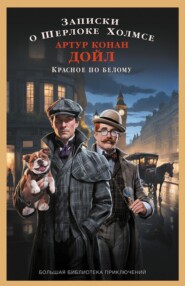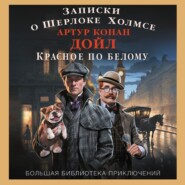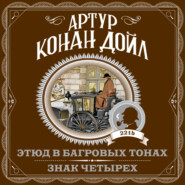По всем вопросам обращайтесь на: info@litportal.ru
(©) 2003-2025.
✖
Adventure of Wisteria Lodge
Автор
Год написания книги
2014
Настройки чтения
Размер шрифта
Высота строк
Поля
“And it is my duty to warn Mr. Scott Eccles that it may be used against him.”
“Mr. Eccles was going to tell us about it when you entered the room. I think, Watson, a brandy and soda would do him no harm. Now, sir, I suggest that you take no notice of this addition to your audience, and that you proceed with your narrative exactly as you would have done had you never been interrupted.”
Our visitor had gulped off the brandy and the colour had returned to his face. With a dubious glance at the inspector's notebook, he plunged at once into his extraordinary statement.
“I am a bachelor,” said he, “and being of a sociable turn I cultivate a large number of friends. Among these are the family of a retired brewer called Melville, living at Abermarle Mansion, Kensington. It was at his table that I met some weeks ago a young fellow named Garcia. He was, I understood, of Spanish descent and connected in some way with the embassy. He spoke perfect English, was pleasing in his manners, and as good-looking a man as ever I saw in my life.”
“In some way we struck up quite a friendship, this young fellow and I. He seemed to take a fancy to me from the first, and within two days of our meeting he came to see me at Lee. One thing led to another, and it ended in his inviting me out to spend a few days at his house, Wisteria Lodge, between Esher and Oxshott. Yesterday evening I went to Esher to fulfil this engagement.”
“He had described his household to me before I went there. He lived with a faithful servant, a countryman of his own, who looked after all his needs. This fellow could speak English and did his housekeeping for him. Then there was a wonderful cook, he said, a half-breed whom he had picked up in his travels, who could serve an excellent dinner. I remember that he remarked what a queer household it was to find in the heart of Surrey, and that I agreed with him, though it has proved a good deal queerer than I thought.”
“I drove to the place– about two miles on the south side of Esher. The house was a fair-sized one, standing back from the road, with a curving drive which was banked with high evergreen shrubs. It was an old, tumbledown building in a crazy state of disrepair. When the trap pulled up on the grass-grown drive in front of the blotched and weather-stained door, I had doubts as to my wisdom in visiting a man whom I knew so slightly. He opened the door himself, however, and greeted me with a great show of cordiality. I was handed over to the manservant, a melancholy, swarthy individual, who led the way, my bag in his hand, to my bedroom. The whole place was depressing. Our dinner was tete-a-tete, and though my host did his best to be entertaining, his thoughts seemed to continually wander, and he talked so vaguely and wildly that I could hardly understand him. He continually drummed his fingers on the table, gnawed his nails, and gave other signs of nervous impatience. The dinner itself was neither well served nor well cooked, and the gloomy presence of the taciturn servant did not help to enliven us. I can assure you that many times in the course of the evening I wished that I could invent some excuse which would take me back to Lee.”
“One thing comes back to my memory which may have a bearing upon the business that you two gentlemen are investigating. I thought nothing of it at the time. Near the end of dinner a note was handed in by the servant. I noticed that after my host had read it he seemed even more distrait and strange than before. He gave up all pretence at conversation and sat, smoking endless cigarettes, lost in his own thoughts, but he made no remark as to the contents. About eleven I was glad to go to bed. Some time later Garcia looked in at my door– the room was dark at the time– and asked me if I had rung. I said that I had not. He apologized for having disturbed me so late, saying that it was nearly one o'clock. I dropped off after this and slept soundly all night.”
“And now I come to the amazing part of my tale. When I woke it was broad daylight. I glanced at my watch, and the time was nearly nine. I had particularly asked to be called at eight, so I was very much astonished at this forgetfulness. I sprang up and rang for the servant. There was no response. I rang again and again, with the same result. Then I came to the conclusion that the bell was out of order. I huddled on my clothes and hurried downstairs in an exceedingly bad temper to order some hot water. You can imagine my surprise when I found that there was no one there. I shouted in the hall. There was no answer. Then I ran from room to room. All were deserted. My host had shown me which was his bedroom the night before, so I knocked at the door. No reply. I turned the handle and walked in. The room was empty, and the bed had never been slept in. He had gone with the rest. The foreign host, the foreign footman, the foreign cook, all had vanished in the night! That was the end of my visit to Wisteria Lodge.”
Sherlock Holmes was rubbing his hands and chuckling as he added this bizarre incident to his collection of strange episodes.
“Your experience is, so far as I know, perfectly unique,” said he. “May I ask, sir, what you did then?”
“I was furious. My first idea was that I had been the victim of some absurd practical joke. I packed my things, banged the hall door behind me, and set off for Esher, with my bag in my hand. I called at Allan Brothers', the chief land agents in the village, and found that it was from this firm that the villa had been rented. It struck me that the whole proceeding could hardly be for the purpose of making a fool of me, and that the main object must be to get out of the rent. It is late in March, so quarter-day is at hand. But this theory would not work. The agent was obliged to me for my warning, but told me that the rent had been paid in advance. Then I made my way to town and called at the Spanish embassy. The man was unknown there. After this I went to see Melville, at whose house I had first met Garcia, but I found that he really knew rather less about him than I did. Finally when I got your reply to my wire I came out to you, since I gather that you are a person who gives advice in difficult cases. But now, Mr. Inspector, I understand, from what you said when you entered the room, that you can carry the story on, and that some tragedy had occurred. I can assure you that every word I have said is the truth, and that, outside of what I have told you, I know absolutely nothing about the fate of this man. My only desire is to help the law in every possible way.”
“I am sure of it, Mr. Scott Eccles– I am sure of it,” said Inspector Gregson in a very amiable tone. “I am bound to say that everything which you have said agrees very closely with the facts as they have come to our notice. For example, there was that note which arrived during dinner. Did you chance to observe what became of it?”
“Yes, I did. Garcia rolled it up and threw it into the fire.”
“What do you say to that, Mr. Baynes?”
The country detective was a stout, puffy, red man, whose face was only redeemed from grossness by two extraordinarily bright eyes, almost hidden behind the heavy creases of cheek and brow. With a slow smile he drew a folded and discoloured scrap of paper from his pocket.
“It was a dog-grate, Mr. Holmes, and he overpitched it. I picked this out unburned from the back of it.”
Holmes smiled his appreciation.
“You must have examined the house very carefully to find a single pellet of paper.”
“I did, Mr. Holmes. It's my way. Shall I read it, Mr. Gregson?”
The Londoner nodded.
“The note is written upon ordinary cream-laid paper without watermark. It is a quarter-sheet. The paper is cut off in two snips with a short-bladed scissors. It has been folded over three times and sealed with purple wax, put on hurriedly and pressed down with some flat oval object. It is addressed to Mr. Garcia, Wisteria Lodge. It says:
“Our own colours, green and white. Green open, white shut. Main stair, first corridor, seventh right, green baize. Godspeed. D.”
“It is a woman's writing, done with a sharp-pointed pen, but the address is either done with another pen or by someone else. It is thicker and bolder, as you see.”
“A very remarkable note,” said Holmes, glancing it over. “I must compliment you, Mr. Baynes, upon your attention to detail in your examination of it. A few trifling points might perhaps be added. The oval seal is undoubtedly a plain sleeve-link– what else is of such a shape? The scissors were bent nail scissors. Short as the two snips are, you can distinctly see the same slight curve in each.”
The country detective chuckled.
“I thought I had squeezed all the juice out of it, but I see there was a little over,” he said. “I'm bound to say that I make nothing of the note except that there was something on hand, and that a woman, as usual was at the bottom of it.”
Mr. Scott Eccles had fidgeted in his seat during this conversation.
“I am glad you found the note, since it corroborates my story,” said he. “But I beg to point out that I have not yet heard what has happened to Mr. Garcia, nor what has become of his household.”
“As to Garcia,” said Gregson, “that is easily answered. He was found dead this morning upon Oxshott Common, nearly a mile from his home. His head had been smashed to pulp by heavy blows of a sandbag or some such instrument, which had crushed rather than wounded. It is a lonely corner, and there is no house within a quarter of a mile of the spot. He had apparently been struck down first from behind, but his assailant had gone on beating him long after he was dead. It was a most furious assault. There are no footsteps nor any clue to the criminals.”
“Robbed?”
“No, there was no attempt at robbery.”
“This is very painful– very painful and terrible,” said Mr. Scott Eccles in a querulous voice, “but it is really uncommonly hard on me. I had nothing to do with my host going off upon a nocturnal excursion and meeting so sad an end. How do I come to be mixed up with the case?”
“Very simply, sir,” Inspector Baynes answered. “The only document found in the pocket of the deceased was a letter from you saying that you would be with him on the night of his death. It was the envelope of this letter which gave us the dead man's name and address. It was after nine this morning when we reached his house and found neither you nor anyone else inside it. I wired to Mr. Gregson to run you down in London while I examined Wisteria Lodge. Then I came into town, joined Mr. Gregson, and here we are.”
“I think now,” said Gregson, rising, “we had best put this matter into an official shape. You will come round with us to the station, Mr. Scott Eccles, and let us have your statement in writing.”
“Certainly, I will come at once. But I retain your services, Mr. Holmes. I desire you to spare no expense and no pains to get at the truth.”
My friend turned to the country inspector.
“I suppose that you have no objection to my collaborating with you, Mr. Baynes?”
“Highly honoured, sir, I am sure.”
“You appear to have been very prompt and businesslike in all that you have done. Was there any clue, may I ask, as to the exact hour that the man met his death?”
“He had been there since one o'clock. There was rain about that time, and his death had certainly been before the rain.”
“But that is perfectly impossible, Mr. Baynes,” cried our client. “His voice is unmistakable. I could swear to it that it was he who addressed me in my bedroom at that very hour.”
“Remarkable, but by no means impossible,” said Holmes, smiling.
“You have a clue?” asked Gregson.
“On the face of it the case is not a very complex one, though it certainly presents some novel and interesting features. A further knowledge of facts is necessary before I would venture to give a final and definite opinion. By the way, Mr. Baynes, did you find anything remarkable besides this note in your examination of the house?”
The detective looked at my friend in a singular way.
“There were,” said he, “one or two very remarkable things. Perhaps when I have finished at the police-station you would care to come out and give me your opinion of them.”
“I am entirely at your service,” said Sherlock Holmes, ringing the bell. “You will show these gentlemen out, Mrs. Hudson, and kindly send the boy with this telegram. He is to pay a five-shilling reply.”
We sat for some time in silence after our visitors had left. Holmes smoked hard, with his browns drawn down over his keen eyes, and his head thrust forward in the eager way characteristic of the man.
“Well, Watson,” he asked, turning suddenly upon me, “what do you make of it?”

















